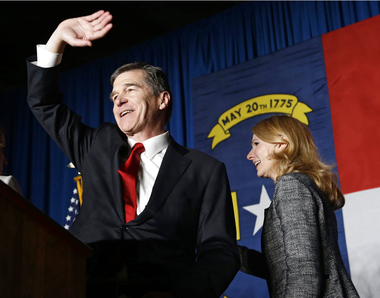Angry at Trump, North Carolina Democrats hope for 2018 gains

North Carolina Democrats say they are beginning 2018 energized and intent on regaining their historical control of the state's General Assembly, harnessing anger over Republican Donald Trump's presidency and buoyed by Democratic victories elsewhere.
Eager to reassert their longtime influence on North Carolina politics, the Democrats already have already fielded an unusually large pool of candidates for 100 seats in the 170-member bicameral legislature. Though official candidate filing doesn't start until mid-February, the Democrats are quickly approaching the number of House and Senate seats they contested in 2016 and hope to strongly contest each seat in November.
Republicans used a similar full-court candidate strategy in 2010 to seize control of both chambers for the first time in 140 years. They've held veto-proof majorities since 2013, allowing them to impose a right-leaning agenda including broad tax cuts, abortion restrictions and taxpayer-funded grants for children to attend private schools.
They also passed the state's "bathroom bill," later partially repealed. While Democrats regained a bully pulpit when Gov. Roy Cooper narrowly defeated GOP incumbent Pat McCrory in 2016, they've still been unable to stop the GOP agenda because most of the Democratic governor's vetoes were overridden.
The 2016 election, including Trump's victory, "was pretty much a wake-up call and I just could not rely on other people to represent what I think is important," said Terri LeGrand, a first-time state House candidate from Winston-Salem. "The current leadership in Raleigh has had the wrong priorities on lowering taxes, instead of investing in the future." While Trump won the South in 2016 save for Virginia, his margin over Hillary Clinton in North Carolina was less than 4 percentage points.
"People are frustrated with the Republican leadership in the North Carolina General Assembly, they're frustrated with the administration in Washington and they're ready for candidates who care about education and health care and the middle class," Cooper said.
With the GOP holding a 75-45 majority in the North Carolina House and 35-15 Senate advantage, Democrats would need to flip 16 House seats and 11 Senate seats in November to take back the General Assembly. Ending veto-proof majorities, which would force Republicans to negotiate with Cooper and some Democrats on some issues, would require only four House seats or six Senate seats. All legislators serve two-year terms.
Rep. Graig Meyer of Orange County said the party is well on its way to fielding candidates for all 120 House seats. "Recruitments definitely got easier after Virginia," said Meyer, who is helping to recruit candidates like LeGrand through the state party's new "Pipeline Project." Meyer and others have highlighted new female and LGBT candidates.
North Carolina's 13 U.S. House seats are also on the November ballots, but no U.S. Senate that would otherwise bring in tens of millions of dollars in campaign ads statewide.
North Carolina political consultants from both parties said in interviews that 2018 election outcomes will rest on registered unaffiliated voters. In 2017, that group became the state's second largest voter bloc, surpassing Republicans. Democrats still remain at the top, though their share has fallen of late.
Dr. Rick Foulke of Waxhaw, a retired oncologist and another first-time state House candidate, knows what it's like to be an unaffiliated voter. He was one until he switched his registration to a Democrat amid unhappiness with Republican lawmakers, particularly on redistricting favoring the GOP and their refusal to expand Medicaid to the state's working poor.
Those and other Republican policies "got me off the sidelines and persuaded me that I really need to be in this fight," Foulke said.
By GARY D. ROBERTSON, Associated Press
Copyright Associated Press. All rights reserved.
The Gayly 1/1/2018 @10:14 a.m.





